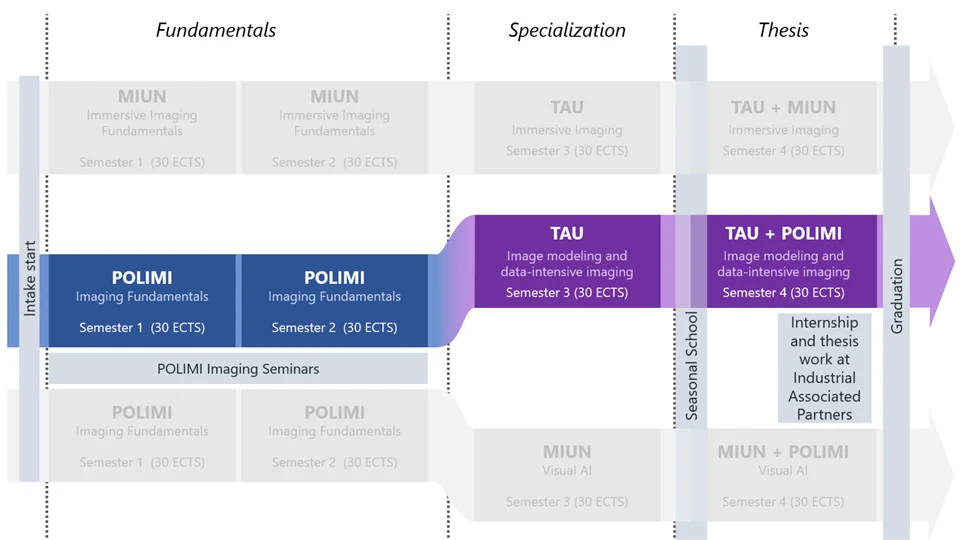Image Modelling and Data‑intensive Imaging Track
Navigate the intricate maze of Image Modelling and Data-Intensive Imaging, where pixel meets precision. Immerse yourself in this dynamic field, evolving rapidly to capture, process, and render the world in breathtaking new dimensions.
Image Modelling and Data-intensive Imaging
Welcome to a transformative exploration of Image Modelling and Data-Intensive Imaging. This track will guide you through the labyrinth of image creation and processing, taking you from the basics of imaging sensors to the avant-garde of 3D & Virtual Reality. Engage with hands-on labs, collaborate on real-world projects, and decode the algorithms and methods that are painting our digital canvas. These are not just abstract concepts; they are the tools forging the forefront of our visual world. Upon completion, you will emerge with an enriched perspective on the marvels of modern imaging.
Courses
Within the Image Modelling and Data-intensive Imaging track, the following courses are given to support you in your journey of becoming an imaging expert.
Year one at Politecnico di Milano:
- Software Engineering II, 5 ECTS
- Artificial Neural Networks and Deep Learning, 5 ECTS
- Foundations of Operations Research, 5 ECTS
- Advanced Computer Architectures, 5 ECTS
- Computing Infrastructures, 5 ECTS
- Machine Learning, 5 ECTS
- Applied Statistics, 10 ECTS
- Mathematical Models and Methods for Image Processing, 5 ECTS
- Three elective courses (in total, 15 ECTS)
- Imaging Seminars at Politecnico di Milano
- Imaging Seminars are an innovative educational tool, designed to instruct students about the practical challenges and recent trends in imaging science and technology. Seminars will host presenters from both academic and industrial associated partners visiting Politecnico di Milano. Furthermore, these seminars will constitute a unique opportunity to help students to tailor their study plans to what mostly fit their interests and career goals and to identify a related thesis topic accordingly.
Year two at Tampere University:
- Students have to collect at least 30 ECTS from elective courses listed below (excluding Master Thesis):
- Fourier Optics, 5 ECTS
- Imaging Sensors and Systems, 5 ECTS
- Advanced Image Processing, 5 ECTS
- Imaging Systems Lab, 5 ECTS
- Deep Learning for Computer Vision, 5 ECTS
- 3D and Extended Reality, 5 ECTS
- Vector Space Methods for Signal and Image Processing, 5 ECTS
- Deep Learning, 5 ECTS
- Tampere Imaging Ecosystem seminar – No additional credits
- Engineers from Imaging Tampere companies present challenging imaging problems and trends related with their work & Students being part-time interns at the companies, present their cases and stories.
- Master Thesis Seminar – Obligatory part of thesis with no additional credits
- Master Thesis, 30 ECTS
The master’s degree project
The degree project amounts to one full semester of full-time work and is normally undertaken during the last semester. The project is carried out in the area defined by and relevant to the courses taken during the programme. The thesis project will be jointly supervised by professors at Tampere University and Politecnico di Milano.
Track requirements
The entry requirements for Image Modelling and Data-intensive Imaging track are:
- The students should be eligible for application and admission (check Application and Admission page)
- The selected students need to be admitted to two programs in both Politecnico di Milano and Tampere University:
- Computer Science and Engineering, at Politecnico di Milano
- Erasmus Mundus Joint Master's in Imaging at Tampere University
- Students must satisfy the degree requirements of both institutions, i.e., complete the offered courses.
Type of degree
The successful completion of the curriculum is rewarded by two diplomas from Politecnico di Milano and Tampere University for the “Image Modelling and Data-intensive Imaging” track. The degrees will be:
- Master of Science in Computer Science and Engineering for Politecnico di Milano, and
- Master of Science in Technology for Tampere University
After the programme
The Image Modelling and Data-intensive Imaging track further refines expertise in the intricate domains of image modeling, sensor technologies, computer vision, and data-intensive imaging modalities such as thermal, multi-spectral, and immersive imaging. This comprehensive curriculum primes graduates for roles focusing on optical information processing, image enhancement, and 3D visual technologies. From understanding the nuances of optics and image sensing to mastering advanced image processing and computer vision techniques, students are provided with a well-rounded approach to visual media.
The program's flexible structure, enabling students to customize their studies based on individual interests, renders them particularly adept for roles in companies working on AR/VR applications, optical systems, and digital media solutions. A plethora of opportunities beckon in sectors such as healthcare, entertainment, defence, and tech startups that focus on imaging innovations. Whether one is inclined toward joining industry giants, engaging in research, or venturing into the startup ecosystem, this master's program serves as a robust stepping stone into a promising future.
